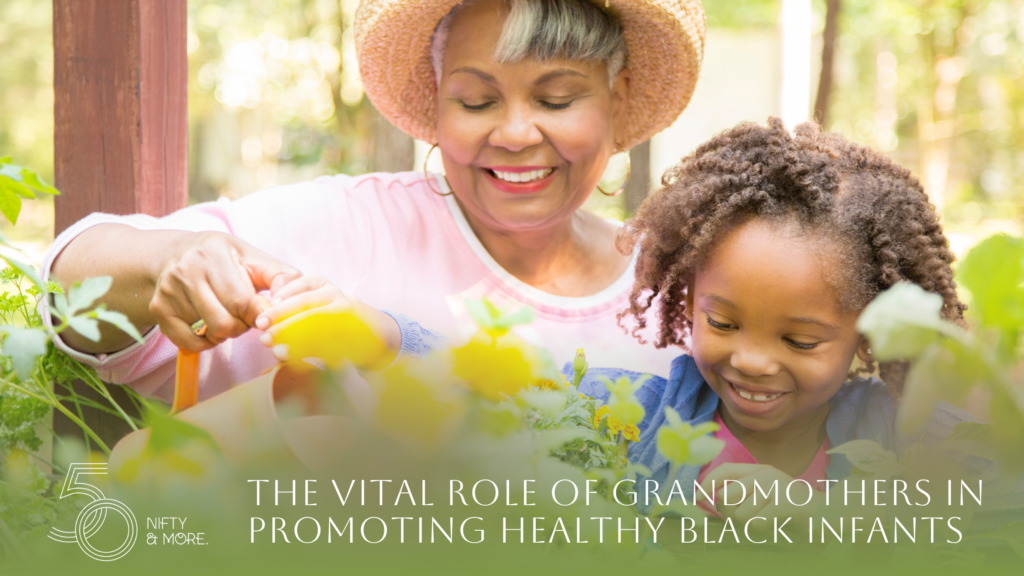
In the rich tapestry of Black culture, grandmothers hold a revered position, often serving as the bedrock of family structures. Particularly for Black women over 50, their contributions extend beyond traditional caregiving; they are key advocates for maternal health, especially in the context of ensuring that their daughters have healthy infants. This article explores the crucial role grandmothers play in the lives of their daughters, the importance of their influence on maternal and infant health, and presents statistics that highlight the factors contributing to the increased birth rate of healthy Black babies.
The Grandmother’s Influence
Grandmothers are often seen as the wise matriarchs of the family, possessing a wealth of knowledge and experience. Their influence is particularly significant during pregnancy and the early years of a child’s life. Research shows that when grandmothers are involved in the care of their grandchildren, there are improved outcomes for both maternal health and infant health.
Emotional Support and Guidance
One of the most critical roles of grandmothers is providing emotional support and guidance to new mothers. The transition into motherhood can be overwhelming, especially for young mothers. Grandmothers often step in to share the wisdom gained from their own experiences, helping to alleviate fears and uncertainties. Their presence fosters a nurturing environment, allowing new mothers to feel supported and confident in their abilities to care for their infants.

Health Education and Advocacy
Grandmothers play a pivotal role in educating their daughters about health practices and advocating for proper healthcare. They often share traditional knowledge passed down through generations, which can include dietary practices, breastfeeding techniques, and infant care methods that promote health and wellness.
According to the Centers for Disease Control and Prevention (CDC), Black women face higher rates of maternal mortality compared to their white counterparts. In 2021, the maternal death rate for Black women was 69.9 deaths per 100,000 live births, compared to 26.6 for white women. This alarming statistic underscores the need for informed and engaged caregivers who can advocate for better health outcomes. Grandmothers can play a crucial role in ensuring that mothers receive appropriate prenatal and postnatal care, understanding the importance of regular check-ups and vaccinations for their infants.
Building Strong Support Networks
The African proverb, “It takes a village to raise a child,” resonates deeply within the Black community. Grandmothers often act as the cornerstone of these support networks, fostering connections between family members and the broader community. They encourage collaboration and shared responsibility, helping to create a nurturing environment that promotes the health and well-being of children.
Statistics reveal that community support systems are vital in reducing adverse health outcomes. A study published in the American Journal of Public Health found that social support significantly reduces the risk of preterm birth and low birth weight among Black infants. Grandmothers, as pivotal figures in these networks, can mobilize family and community members to support new mothers, whether through emotional support, childcare assistance, or advocacy for healthcare resources.
The Impact of Grandmothers on Infant Health

Breastfeeding and Nutrition
Breastfeeding is one of the most effective ways to ensure a healthy start for infants. Research indicates that breastfeeding can reduce the risk of infections, chronic diseases, and even sudden infant death syndrome (SIDS). Grandmothers often play a significant role in encouraging and supporting new mothers to breastfeed. Their encouragement can help increase breastfeeding rates among Black mothers, which is crucial given that the CDC reports that Black infants are less likely to be breastfed compared to their white counterparts.
Furthermore, grandmothers can impart traditional nutritional practices that emphasize healthy eating. This cultural knowledge can help new mothers make informed decisions about their diet during pregnancy and breastfeeding, ultimately benefiting the health of their infants.
Addressing Health Disparities
Health disparities among Black infants are a serious concern, with higher rates of infant mortality and morbidity compared to other racial and ethnic groups. According to the CDC, the infant mortality rate for Black infants was 11.4 deaths per 1,000 live births in 2020, compared to 4.9 for white infants. Such disparities highlight the urgent need for effective interventions.
Grandmothers can act as advocates within their families and communities to address these disparities. By educating their daughters about the importance of regular prenatal care, vaccinations, and healthy lifestyle choices, grandmothers can help reduce the risks associated with poor health outcomes. They can also encourage mothers to seek out healthcare providers who are culturally competent and sensitive to their needs.

Statistics on Healthy Birth Outcomes
The following statistics illustrate the factors contributing to the increased birth rate of healthy Black babies:
1. Prenatal Care: Access to quality prenatal care is essential for healthy pregnancies. According to the National Center for Health Statistics, mothers who receive adequate prenatal care are more likely to have healthy birth outcomes. In 2019, only 67.8% of Black mothers received adequate prenatal care compared to 84.3% of white mothers.
2. Education and Income: Maternal education and income are significant determinants of infant health. The CDC reports that women with a college degree are less likely to experience adverse birth outcomes. In 2020, 69.5% of Black women with a college degree had healthy birth outcomes, compared to 51.2% of those without a high school diploma.
3. Smoking and Substance Use: Smoking during pregnancy significantly increases the risk of low birth weight and other complications. The CDC indicates that 7.5% of Black women smoked during pregnancy in 2020, highlighting the need for community support and education to reduce these rates.
4. Mental Health: Maternal mental health is also critical for healthy pregnancies. According to the CDC, Black women experience higher rates of postpartum depression, which can adversely affect infant health. Support from grandmothers can help mitigate these challenges by providing emotional and practical assistance.
The role of grandmothers, particularly Black women over 50, is invaluable in the promotion of healthy Black infants. Their influence extends beyond caregiving; they are advocates, educators, and supporters in the maternal health journey. By providing emotional support, health education, and fostering community networks, grandmothers can help ensure that their daughters have the resources and knowledge needed to raise healthy children.
As we continue to confront the disparities in maternal and infant health, it is essential to recognize and empower the voices of grandmothers in the Black community. Their wisdom and experience can be instrumental in shaping the health outcomes of future generations. By collectively advocating for better health resources and support systems, we can work towards a future where all Black infants have the opportunity for a healthy start in life.
For more information and resources, visit https://blackinfanthealth.org/. Their mission is to to improve health among Black mothers and babies by empowering pregnant and mothering Black women to make healthy choices for a brighter future.


Be the first to comment